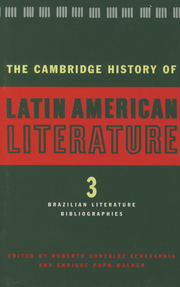Book contents
- Frontmatter
- Introduction to Volume 3
- 1 The literary historiography of Brazil
- 2 Colonial Brazilian literature
- 3 Brazilian poetry from the 1830s to the 1880s
- 4 Brazilian poetry from 1878 to 1902
- 5 The Brazilian theatre up to 1900
- 6 Brazilian fiction from 1800 to 1855
- 7 The Brazilian novel from 1850 to 1900
- 8 Brazilian fiction from 1900 to 1945
- 9 Brazilian prose from 1940 to 1980
- 10 The Brazilian short story
- 11 Brazilian poetry from 1900 to 1922
- 12 Brazilian poetry from Modernism to the 1990s
- 13 The Brazilian theatre in the twentieth century
- 14 Brazilian popular literature (the literatura de cordel)
- 15 Literary criticism in Brazil
- 16 The essay: architects of Brazilian national identity
- 17 The Brazilian and the Spanish American literary traditions: a contrastive view
- Bibliography
- Index
- References
2 - Colonial Brazilian literature
Published online by Cambridge University Press: 28 March 2008
- Frontmatter
- Introduction to Volume 3
- 1 The literary historiography of Brazil
- 2 Colonial Brazilian literature
- 3 Brazilian poetry from the 1830s to the 1880s
- 4 Brazilian poetry from 1878 to 1902
- 5 The Brazilian theatre up to 1900
- 6 Brazilian fiction from 1800 to 1855
- 7 The Brazilian novel from 1850 to 1900
- 8 Brazilian fiction from 1900 to 1945
- 9 Brazilian prose from 1940 to 1980
- 10 The Brazilian short story
- 11 Brazilian poetry from 1900 to 1922
- 12 Brazilian poetry from Modernism to the 1990s
- 13 The Brazilian theatre in the twentieth century
- 14 Brazilian popular literature (the literatura de cordel)
- 15 Literary criticism in Brazil
- 16 The essay: architects of Brazilian national identity
- 17 The Brazilian and the Spanish American literary traditions: a contrastive view
- Bibliography
- Index
- References
Summary
Brazil entered the consciousness of the European world late in April of 1500. Beginning with its conquest of Ceuta in 1415, Portugal had moved beyond the narrow confines of the western shore of the Iberian peninsula, eager to discover a sea route to the rich spice lands of India and the East. The Portuguese sailed down the African coast, reaching the Cape of Good Hope in 1488; Vasco da Gama’s small fleet entered the Indian harbor of Calicut only ten years later. The Portuguese regarded da Gama’s voyage as one of the greatest accomplishments of human history, but the rulers of Calicut were clearly less than impressed. When da Gama returned to Lisbon, it was decided to mount a much more considerable show of force. A new fleet, 13 ships and about 1,100 men under the command of Pedro Alvares Cabral, set sail in early 1500. This fleet – perhaps accidentally carried off-course, perhaps keeping to a pre-arranged plan to follow up on secret reports of a land mass in the South Atlantic – landed on the Brazilian coast on April 22, 1500.
Cabral’s scribe, one Pero Vaz de Caminha, was greatly moved by the beauty of all that he saw during the ten days he spent in this new land, setting down a poetic and profoundly mythic vision of fertility and innocence. Caminha was struck, almost at first glance, by the apparently inexhaustible abundance and goodness of the land – and by the fact that all this visible and latent fertility served no useful purpose. He wrote:
All the land along the coast, from one end to the other, is … very level and beautiful… So far we have been unable to discover whether there is any gold or silver or any other metal or iron there; we have not seen any … There is a great abundance, an infinite abundance of water.
(Cortesāo, A Carta de Pero Vaz de Caminha, 256)- Type
- Chapter
- Information
- The Cambridge History of Latin American Literature , pp. 47 - 68Publisher: Cambridge University PressPrint publication year: 1996
References
- 1
- Cited by

